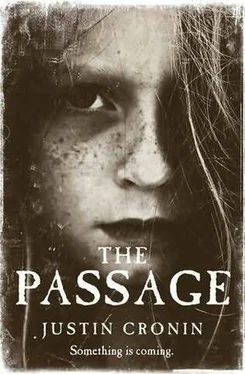“Do I sleep in here?”
So many hours had passed since she’d heard the girl’s voice that Lacey wasn’t sure she’d heard the question correctly. She searched the little girl’s face. The question, strange as it was, made sense to her.
“Why would you sleep in the bathroom, Amy?”
She looked at the floor. “Mama says I have to be quiet.”
Lacey didn’t know what to make of this. “No, of course not. You’ll sleep in your room. It’s right next to mine, I’ll show you.”
The room was clean and spare, bare-walled with just a bed and a bureau and a small writing table, not even a rug on the floor to warm it, and Lacey wished she had something to make it nice for a little girl. She thought that, tomorrow, she would ask Sister Arnette if she could buy a small rug to put by the bed, so Amy’s feet wouldn’t have to touch the cold floorboards in the mornings. She tucked Amy under the blankets and sat on the edge of the mattress. Through the floor she could hear the faint rumble of the television downstairs, and the tick of pipes expanding behind the walls, and outside, the wind fingering the March leaves of the oaks and maples and the soft hum of evening traffic on Poplar Avenue. The zoo was two blocks behind the convent, at the far end of the park; on summer nights when the windows were open, they could sometimes hear the colabus monkeys, whooping and screeching in their cages. This was a strange and wonderful thing for Lacey to hear, so many thousands of miles from home, but when she had visited the zoo she’d discovered it was an awful place, like a jail; the pens were small, the cats were kept in barren cages behind walls of Plexiglas, the elephants and giraffes wore chains on their legs. All the animals looked depressed. Most could barely be bothered to move at all, and the people who came to see them were loud and boorish and let their children throw popcorn through the bars to make the animals notice them. It was more than Lacey could bear, and she had left quickly, close to tears. It broke her heart to see God’s creatures treated so cruelly, with such coldhearted indifference, for no purpose.
But now, sitting on the edge of the bed, she thought that it might be something Amy would like. Perhaps she’d never been to a zoo at all. As long as there was nothing Lacey could do to ease the animals’ suffering, it didn’t seem sinful, a second wrong piled on top of the first, to bring a little girl who had so little happiness in her life to see them. She would ask Sister Arnette in the morning about this, when she asked about the rug.
“There now,” she said, and adjusted Amy’s blanket. The girl was lying very still, almost as if she were afraid to move. “All safe and sound. And I’m just next door if you need anything. Tomorrow we’ll do something fun, you’ll see. The two of us.”
“Can you leave the light on?”
Lacey told her she would. Then she leaned over and kissed her on the forehead. The air around her smelled like jam, from the shampoo.
“I like your sisters,” Amy said.
Lacey felt herself smiling; with everything that had happened, she had somehow failed to anticipate this misunderstanding. “Yes. Well. It’s difficult to explain. You see, we’re not actual sisters, not how you mean. We do not have the same parents. But we are sisters nonetheless.”
“But how can you be?”
“Oh, there are other ways to be sisters. We are sisters in spirit. We are sisters in the eyes of God.” She jostled Amy’s hand. “Even Sister Arnette.”
Amy frowned. “She’s cranky.”
“So she is. But it’s just her way. And she’s glad you’re here. Everyone is. I don’t think we even realized how much we were missing, until you came here.” She touched Amy’s hand again and rose. “Now, enough talk. You need your sleep.”
“I promise I’ll be quiet.”
At the doorway, Lacey stopped. “You do not have to be,” she said.
That night Lacey dreamed; in the dream she was a little girl again, in the fields behind her house. She was huddled under a low palm bush, its long fronds like a tent around her, licking the skin of her arms and face, and her sisters were there, too, though not exactly; her sisters were running away. Behind them she heard men or, rather, she felt them, their dark presences; she heard the pop of gunfire and her mother’s voice, yelling, screaming, telling them, Run away, children, run as fast as you can, though she, Lacey, was frozen in place with fear; she seemed to have turned into some new substance, a kind of living wood, and couldn’t move a muscle. She heard more popping, and with the pops came flashes of light, severing the darkness like a blade. At those instants she could see everything around her: her house and the fields and the men moving through them, men who sounded like soldiers but weren’t dressed like soldiers, who swept the ground before them with the barrels of their rifles. The world appeared to her this way, in a series of still pictures; she was afraid but could not look away. Her legs and feet were wet, not cold but curiously warm; she realized she had urinated on herself, though she did not remember doing this. In her nose and mouth she tasted bitter smoke, and sweat, and something else, which she knew but could not name. It was the taste of blood.
Then she felt it: someone was near. It was one of the men. She could hear the rattle of his breaths in his chest, his searching footsteps; she could smell the fear and anger wicking off his body like a glowing vapor. Don’t move, Lacey , said the voice, fierce and burning. Don’t move . She closed her eyes, not even daring to breathe; her heart was beating so hard inside her, it was as if that’s all she was now, a beating heart. His shadow fell upon her, passing over her face and body like a great black wing. When she opened her eyes again he was gone; the fields were empty, and she was alone.
She awoke with a start, terror coursing through her. But even as she realized where she was, she felt the dream breaking up inside her; it turned a corner and darted out of sight. The touch of leaves on her skin. A voice, whispering. A smell, like blood. But now even that was gone.
Then she felt it. Someone was in the room with her.
She sat up abruptly and saw Amy standing in the doorway. Lacey glanced at the clock. It was just midnight; she had slept only a couple of hours.
“What is it, child?” she said softly. “Are you all right?”
The little girl stepped into the room. Her pajamas shimmered in the light of the streetlamp outside Lacey’s window, so that her body seemed draped with stars and moons. Lacey wondered for a moment if the girl was sleepwalking.
“Amy, did you have a bad dream?”
But Amy said nothing. In the darkness, Lacey couldn’t see the child’s face. Was she crying? She pulled the bedcovers aside to make room for her.
“It’s all right, come here,” Lacey said.
Without a word, Amy climbed into the narrow bed beside her. Her body was giving off waves of heat-not a fever, but nothing ordinary, either. She was glowing like a coal.
“You don’t have to be afraid,” Lacey said. “You’re safe here.”
“I want to stay,” the girl said.
Lacey realized she didn’t mean the room, or Lacey’s bed. She meant permanently, to live. Lacey didn’t know how to respond. By Monday she would have to tell the truth to Sister Arnette; there was simply no avoiding it. What would happen after that-to both of them-she didn’t know. But she saw it now, clearly: by lying about Amy, she had wrapped their fates together.
“We’ll see.”
“I won’t tell anyone. Don’t let them take me away.”
Lacey felt a shiver of fear. “Who, Amy? Who will take you away?”
Amy said nothing.
Читать дальше












